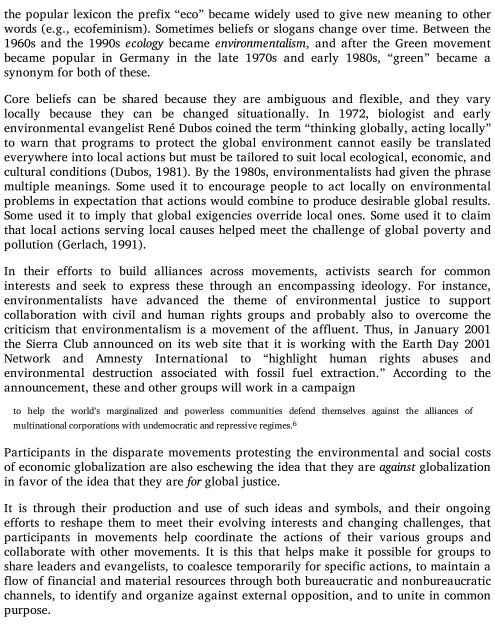RAND_MR1382
You also want an ePaper? Increase the reach of your titles
YUMPU automatically turns print PDFs into web optimized ePapers that Google loves.
the popular lexicon the prefix “eco” became widely used to give new meaning to other<br />
words (e.g., ecofeminism). Sometimes beliefs or slogans change over time. Between the<br />
1960s and the 1990s ecology became environmentalism, and after the Green movement<br />
became popular in Germany in the late 1970s and early 1980s, “green” became a<br />
synonym for both of these.<br />
Core beliefs can be shared because they are ambiguous and flexible, and they vary<br />
locally because they can be changed situationally. In 1972, biologist and early<br />
environmental evangelist René Dubos coined the term “thinking globally, acting locally”<br />
to warn that programs to protect the global environment cannot easily be translated<br />
everywhere into local actions but must be tailored to suit local ecological, economic, and<br />
cultural conditions (Dubos, 1981). By the 1980s, environmentalists had given the phrase<br />
multiple meanings. Some used it to encourage people to act locally on environmental<br />
problems in expectation that actions would combine to produce desirable global results.<br />
Some used it to imply that global exigencies override local ones. Some used it to claim<br />
that local actions serving local causes helped meet the challenge of global poverty and<br />
pollution (Gerlach, 1991).<br />
In their efforts to build alliances across movements, activists search for common<br />
interests and seek to express these through an encompassing ideology. For instance,<br />
environmentalists have advanced the theme of environmental justice to support<br />
collaboration with civil and human rights groups and probably also to overcome the<br />
criticism that environmentalism is a movement of the affluent. Thus, in January 2001<br />
the Sierra Club announced on its web site that it is working with the Earth Day 2001<br />
Network and Amnesty International to “highlight human rights abuses and<br />
environmental destruction associated with fossil fuel extraction.” According to the<br />
announcement, these and other groups will work in a campaign<br />
to help the world’s marginalized and powerless communities defend themselves against the alliances of<br />
multinational corporations with undemocratic and repressive regimes. 6<br />
Participants in the disparate movements protesting the environmental and social costs<br />
of economic globalization are also eschewing the idea that they are against globalization<br />
in favor of the idea that they are for global justice.<br />
It is through their production and use of such ideas and symbols, and their ongoing<br />
efforts to reshape them to meet their evolving interests and changing challenges, that<br />
participants in movements help coordinate the actions of their various groups and<br />
collaborate with other movements. It is this that helps make it possible for groups to<br />
share leaders and evangelists, to coalesce temporarily for specific actions, to maintain a<br />
flow of financial and material resources through both bureaucratic and nonbureaucratic<br />
channels, to identify and organize against external opposition, and to unite in common<br />
purpose.










![Genki - An Integrated Course in Elementary Japanese II [Second Edition] (2011), WITH PDF BOOKMARKS!](https://img.yumpu.com/58322134/1/180x260/genki-an-integrated-course-in-elementary-japanese-ii-second-edition-2011-with-pdf-bookmarks.jpg?quality=85)
![Genki - An Integrated Course in Elementary Japanese I [Second Edition] (2011), WITH PDF BOOKMARKS!](https://img.yumpu.com/58322120/1/182x260/genki-an-integrated-course-in-elementary-japanese-i-second-edition-2011-with-pdf-bookmarks.jpg?quality=85)





